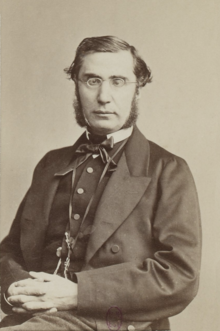Émile Ollivier
| Émile Ollivier | |
|---|---|
 |
|
| 24th Prime Minister of France | |
|
In office 27 December 1869 – 9 August 1870 |
|
| Preceded by | Personal rule of Napoleon III between 1852 and 1869. Previous Prime Minister : Léon Faucher (1852) |
| Succeeded by | Charles Cousin-Montauban, Comte de Palikao |
| Personal details | |
| Born | 2 July 1825 Marseille |
| Died | 20 August 1913 (aged 88) Saint-Gervais-les-Bains |
| Political party | None |
Olivier Émile Ollivier (French: [emil ɔlivje]; 2 July 1825 – 20 August 1913) was a French statesman. Starting as an avid republican opposed to Emperor Napoleon III, he pushed the Emperor toward liberal reforms and in turn came increasingly into Napoleon's grip. He entered the cabinet and was the prime minister when Napoleon fell.
Émile Ollivier was born in Marseille. His father, Démosthène Ollivier (1799–1884), was a vehement opponent of the July Monarchy, and was returned by Marseille to the Constituent Assembly in 1848 which established a republic. The father's opposition to Louis Napoleon led to his banishment after the coup d'état of December 1851, and he returned to France only in 1860.
With the establishment of the Second Republic, his father's influence with Ledru-Rollin secured for Émile Ollivier the position of commissary-general of the département of Bouches-du-Rhône. Ollivier, then twenty-three, had just been called to the Parisian bar. Less radical in his political opinions than his father, he suppressed a socialist uprising at Marseille, commending himself to General Cavaignac, who made him prefect of the department. He was shortly afterwards removed to the comparatively unimportant prefecture of Chaumont-la-Ville (Haute-Marne), a demotion perhaps brought about by his father's enemies. He resigned from the civil service to take up a practice at the bar, where his abilities assured his success.
He re-entered political life in 1857 as deputy for the 3rd circumscription of the Seine département. His candidacy had been supported by the Siècle, and he joined the constitutional opposition. With Alfred Darimon, Jules Favre, JL Hénon and Ernest Picard he formed a group known as Les Cinq (the Five), which wrung from Napoleon III some concessions in the direction of constitutional government.
...
Wikipedia
